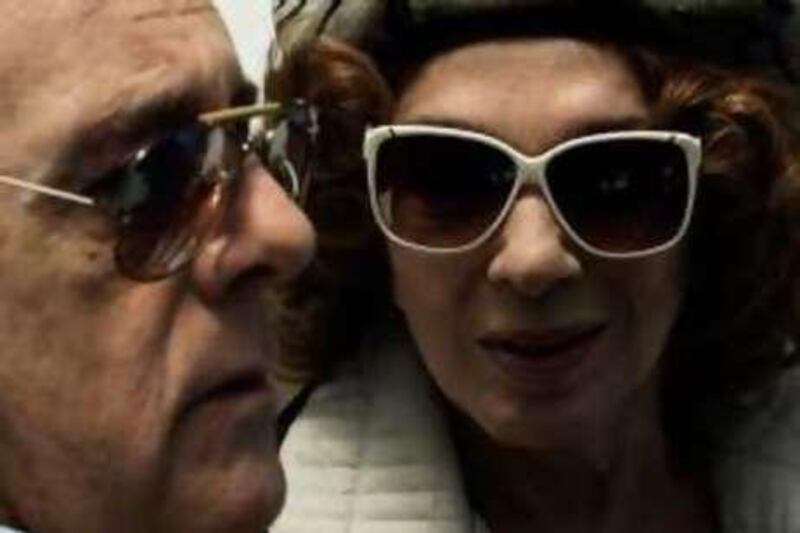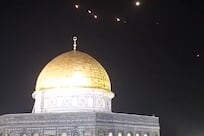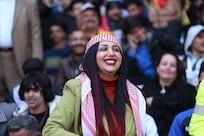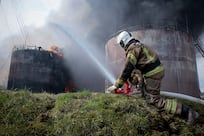Sometimes the best things are closest to home. At the Karlovy Vary International Film Festival, which searches the world every year for innovations in cinema, some of the surprises so far have come from the Czech Republic. Now in its 45th year, Karlovy Vary has long been a window on cinema from East Central Europe. Smaller than the major festivals in Cannes, Toronto, Berlin or Venice, but larger than a regional event, Karlovy Vary is more showcase than market. Its strength is its location, which makes it a bridge between East and West.
Much-awaited this year was Kooky, the latest film from the Czech directors Jan Sverak, who won the Academy Award for Best Foreign Language Film in 1996 for Kolya, a comedy about a confirmed bachelor in Prague who adopts the abandoned child of a Russian emigree. Children also figure in Kooky - not just in its story but as a target audience for its comic drama acted out by puppets sewn together from a mix of materials that seem scavenged from the forest and rubbish heaps.
The story is simple - a young boy loses his stuffed red bear, named Kooky, which triggers a dream in which the bear and his companions in the woods - everything from talking roots to gangs of mushrooms - are hunted by creatures in a car made of junk. There are even chase scenes with these junkmobiles, and Sverak's odd Mad Max effect (inspired by Mel Gibson's 1979 film that built its decors out of trash) helps Kooky shed any of the sentimentality that might be expected in such a tale.
All these characters are puppets - mostly marionettes - and the ingenuity of their construction and performance proves that the venerable Czech puppet tradition is alive and well? and also wildly cinematic in Sverak's hands. Kooky is the kind of fantasy story that defies Hollywood's conventional wisdom of dazzling technology-driven animation and computer-generated effects. Whether the charming low-tech story will find an audience outside the Czech Republic is an open question, although no one expects it to compete with Shrek. There are still plans underway to dub Kooky into English.
If Kooky has moments that are visually magical, so does Three Seasons in Hell, Thomas Masin's film set in the Prague of the late 1940s, which made its world premiere at Karlovy Vary. This is the period of the transition of Czechoslovakia (consisting then of Bohemia, Moravia and Slovakia) from a fragile post-war state into a member of the Communist Bloc. It's not a gentle transition. This moment in history has been the subject of many Czech films, but rarely with such a stunning visual effect.
Masin was a production designer before he took up directing, and it shows. Here, in his feature debut, Prague is recreated in what looks like its jazz age, with elegant interiors and costumes that survived the six years under the Nazis. Young Ivan Heinz (whose poetic name is Egon) flirts with art and Marxism. There's drama in the story, but the real theatrics are in the palette of Masin's film, which shifts from lush colors and lustrous gold to a grey pallor as you witness the seizure of power.
The director doesn't leave much subtlety as to which side he's on, but if you ever came out of a film singing the scenery, this is it. You won't do that after seeing Katka, Helena Trestikova's documentary about 14 years in the life of a drug addict whom the director follows through late adolescence, childbirth, and endless failed therapies. And it certainly won't be a lullaby, as Katka gives birth to a beautiful and surprisingly healthy girl, but can't bring her own life under control.
Trestikova's camera is a witness, rather than a judge - although it will be hard to find anyone who sees Katka's life as anything but a tragedy. As an adolescent, Katka bears an uncanny resemblance to the American actress Juliette Lewis. Her beauty is the least of what she loses in this wrenching film, and the camera is right there at the worst moments. If the metaphorical war on drugs is one subject on the screen at Karlovy Vary, current theatres of war are another. The western offensive against the Taliban in Afghanistan, in which US troops are augmented by European allies in the "coalition", is the subject of Armadillo, a Danish documentary by Janus Metz. The title comes from a base in southern Helmand province from which the unit operates.
Metz gives you the pro forma tearful departures and the fears of young men as they confront the "ground truth" of bullets flying at them, all of which the camera observes at point blank range. Metz and his cinematographer Lars Skree are also there when a well-targeted grenade from the Danes kills a band of Taliban fighters. The soldiers' unrestrained celebration (we witness the decoration of two of them) was controversial in Denmark, where opposition to the war is strong.
Armadillo, which won the Critics Week Grand Prix at Cannes, brings an aesthetic eye to the war documentary genre, as stark mountains in the distance frame the field of operation, and the camera lingers on the green farmlands and silent stone structures. If the Danish documentary brought a cinematic perspective to war, Marwencol, another documentary at Karlovy Vary, brought a perspective that is as odd as it is improbable.
In this extraordinary documentary winner from the South By Southwest Festival in Austin, Texas, Jeff Malmberg starts with a story out of the tabloids. Mark Hogancamp, a longtime alcoholic, is beaten almost to death by thugs after he leaves a tavern in Upstate New York. When he awakes from a coma, he has lost his memory and his dependency on alcohol. He devises an odd therapy, creating Marwencol, a mini-world of a Second World War camp in Belgium with doll-sized soldiers fighting Nazi figurines. If this doesn't return him to sanity, it does produce one of the New York art world's unusual talents.
Among non-fiction filmmakers, Marwencol is one of the most-discussed documentaries of the year. Another surprise at Karlovy Vary came from an unlikely distant source, the Canadian province of Quebec. Suspicions (Jaloux in French) is a no-budget thriller with a minimal cast that takes a troubled young couple to a cabin in the woods where a stranger has a dinner ready for them and has plans for all sorts of misfortune as a last course.
Like a lot of independent films, Suspicions takes the most formulaic of situations and twists them into something new. How many thrillers from Quebec do you see? Spare in its story-telling, but adeptly agile in its acting and vividly shot, Suspicions makes Patrick Demers a director to watch. What would a festival be without a family saga? In Karlovy Vary, Brother & Sister by Daniel Burman of Argentina scrutinised the bond between two unmarried siblings after their mother's death.
The story of middle-aged Susana and Marcos isn't pretty, nor is it tender, but it is wildly funny, as selfish Susana schemes awkwardly to deprive her brother of property, and gentle Marcos holds his resentment inside. Antonio Gasalia as Marcos, who sacrificed the best years of his life for his mother, reaffirms the notion that no good deed goes unpunished. Karlovy Vary has reaped its own rewards. Pavements and cinemas are packed - despite crippling heat and no air conditioning. Young film fans (the sort that cinema owners long for) literally sleep in film queues, sprawled on the floor, bringing a hint of Woodstock to the old Bohemian town of Karlsbad.
Yet, some see the dark side in such crowds. One was the Russian actor Ivan Shvedoff, who played in the grim drama The Albanian, a first film by the German director Johannes Naber about a young generation clashing with poverty and tradition. After sitting with a sold-out crowd in the festival's largest venue to watch the Ukrainian film My Joy by the Russian director Sergei Loznica - chilling even by Russian standards - he said: "My country has just lost 2,500 tourists."





